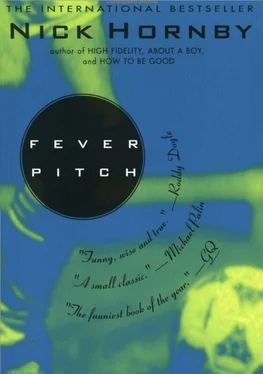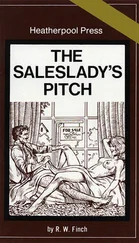I have a photograph from the game played on the Saturday after the Swindon tragedy, away at QPR. George Armstrong is just picking himself up, having scored the winner in a 1-0 win; David Court is running towards him, his arms triumphantly aloft. In the background you can see Arsenal fans on the edge of the stand, silhouetted against a block of flats behind the ground, and they too are punching the sky. I couldn’t understand anything I saw in the picture at all. How could the players care, after the way they had humiliated themselves (and, of course, me) seven days— seven days— before? Why would any fan who had suffered at Wembley the way I had suffered stand up to cheer a nothing goal in a nothing match? I used to stare at this photo for minutes at a time, trying to detect somewhere within it any evidence of the trauma of the previous week, some hint of grief or of mourning, but there was none: apparently everyone had forgotten except me. In my first season as an Arsenal fan I had been betrayed by my mother, my father, the players and my fellow supporters.
ENGLAND v SCOTLAND
May 1969
Although the temptation to plunge into a warm bath containing dissolved essence of Kenneth Wolstenholme is always with me, I know in my heart that in the late sixties and early seventies, some things were better and some things were worse. The England team, of course, was better then: still the world champions, packed with great players, and looking as though they might be able to retain the World Cup in Mexico the following year.
I was proud of England, delighted that my father was taking me to see them play in a big game under floodlights at Wembley (and going back there so soon after the League Cup Final was therapeutic, a successful exorcism of demons that would otherwise have plagued me for years). And though there is no doubt that Colin Bell, Francis Lee and Bobby Moore were better than Geoff Thomas, Dennis Wise and Terry Butcher, it wasn’t just the comparative quality that enabled me to feel unambiguous about that England side. The ambiguity came with age: by the time I was sixteen or seventeen, I knew better than the England manager.
A critical faculty is a terrible thing. When I was eleven there were no bad films, just films that I didn’t want to see, there was no bad food, just Brussels sprouts and cabbage, and there were no bad books—everything I read was great. Then suddenly, I woke up in the morning and all that had changed. How could my sister not hear that David Cassidy was not in the same class as Black Sabbath? Why on earth would my English teacher think that The History of Mr Polly was better than Ten Little Indians by Agatha Christie? And from that moment on, enjoyment has been a much more elusive quality.
But in 1969, as far as I was concerned, there was no such thing as a bad England player. Why would Sir Alf pick someone who wasn’t up to the job? What would be the point? I took it on trust that the eleven players who destroyed Scotland that night—two goals each for Hurst and Peters, Colin Stein replying for the Scots—were the best in the country. (Sir Alf had ignored everyone from Arsenal, which simply confirmed that he knew what he was doing.) And anyway the absence of any live football on television meant that we often didn’t know who was much good or not: the highlights merely showed good players scoring goals, rather than bad players missing them.
By the early seventies I had become an Englishman—that is to say, I hated England just as much as half my compatriots seemed to do. I was alienated by the manager’s ignorance, prejudice and fear, positive that my own choices would destroy any team in the world, and I had a deep antipathy towards players from Tottenham, Leeds, Liverpool and Manchester United. I began to squirm when watching England games on TV, and to feel, as many of us feel, that I had no connection whatsoever with what I saw; I might as well have been Welsh, or Scottish, or Dutch. Is it like this everywhere? I know that in the past the Italians have greeted their boys with rotten tomatoes at the airport when they return from overseas humiliations, but even that sort of commitment is beyond my comprehension. “I hope they get stuffed,” I have heard Englishmen say on numerous occasions in reference to the England team. Is there an Italian or Brazilian or Spanish version of that sentence? It is difficult to imagine.
Part of this contempt may be related to the fact that we have too many players, all of indistinguishable dingy competence; the Welsh and the Irish have very little choice when it comes to putting out a team, and the fans know that their managers simply have to make do. In those circumstances, occasional poor performances are inevitable and victories are little miracles. Then of course there is the procession of England managers that has treated players of real skill and flair—Waddle and Gascoigne, Hoddle and Marsh, Currie and Bowles, George and Hudson, footballers whose gifts are delicate and difficult to harness, but at the same time much more valuable than a pair of leather lungs—with the kind of disdain the rest of us reserve for child molesters. (Which international squad in the world would be unable to find a place for Chris Waddle, the man who in 1991 ambled through the AC Milan back four whenever he chose?) And finally there are the England fans (discussed at greater length elsewhere), whose activities during the eighties hardly encouraged identification with the team in any of the rest of us.
It wasn’t always thus with the fans at international matches. It is impossible not to feel a little ache when one sees replays of games in the 1966 World Cup that did not involve England, for example. In the now-famous game between North Korea and Portugal at Goodison Park (in which the unknown Asian team took a 3-0 lead over one of the best sides in the competition before going out 5-3), you can see a thirty-thousand-plus crowd, the vast majority of whom are Scousers, applauding wildly after goals from each team. It is difficult to imagine the same interest now; more likely, you’d get a couple of thousand scallies making slanty eyes at the Asians in one team, and monkey noises at Eusebio in the other. So, yes, of course I feel nostalgic, even if I am longing for a time which never really belonged to us: like I said, some things were better, some were worse, and the only way one can ever learn to understand one’s own youth is by accepting both halves of the proposition.
The crowd that night contained none of these Goodison saints, but they were no different from the crowds I had been a part of during the rest of the season, with the exception of an extravagantly emotional Scotsman in the row in front who swayed precariously on his seat for the first half and failed to reappear for the second. And most of us actively enjoyed the game, as if for one night only football had become another branch of the entertainment industry. Perhaps, like me, they were enjoying the freedom from the relentless responsibility and pain of club football: I wanted England to win, but they weren’t my team. What, after all, did my country mean to me, a twelve-year-old from the Home Counties, compared to a north London side thirty miles from where I lived, a side I’d never heard of and never thought about nine months previously?
ARSENAL v EVERTON
7.8.69
For the opening game of my first full season I was at a scout camp in Wales. I hadn’t wanted to go. I was never the most ging-gang-gooly gung-ho of scouts at the best of times and, shortly before our departure, I had discovered that my parents were finally getting divorced. Actually, this didn’t disturb me unduly, at least consciously: after all, they had been separated for some time now and the legal process seemed to be a simple confirmation of the separation.
Читать дальше











